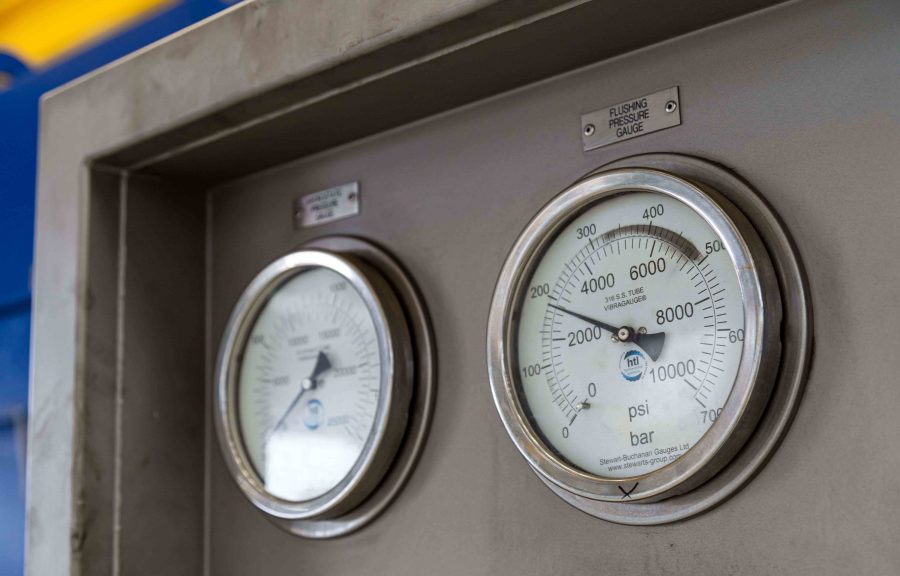As part of ISO 13628, API 17D provides a specification for the design, material, manufacture, testing, marking, storing, shipping and installation of subsea wellhead and tree equipment for the offshore oil and gas industry. The specification applies to both individual sub-assemblies and complete tree assemblies.
The standard sets out instructions for the qualification testing of valve and actuator assemblies used in equipment including; subsea wellheads, mudline wellheads, drill-through mudline wellheads, vertical subsea trees and horizontal subsea trees.
The API 17D qualification consists of a series of tests that must be performed on the assembly as a continuous sequence. Below is a summary of the typical sequence of tests carried out for API 17D.
1. Valve and actuator pre-qualification tests:
- Actuator Factory Acceptance Test (FAT)
- Valve FAT
2. Valve pressure cycling
- Pre-cycle body test
- 200 x body pressure cycles
- Post cycle body test
3. Valve PR2 test
- Force measurement test
- 160 x dynamic cycle tests at room temperature
- Maximum rated temperature tests: (20 x dynamic cycle tests, body and stem seal test, seat test, low pressure seat test)
- Minimum rated temperature tests: (20 x dynamic cycle tests, body and stem seal test, seat test, low pressure seat test)
- Temperature cycle with continuous supplied pressure
- Temperature with applied pressure cycle
- Body test at room temperature
- Seat test at room temperature
- Low pressure body test
- Low pressure seat test
- Final force measurement test
4. Hyperbaric test
- 200 x dynamic cycle tests
5. Endurance cycle test
- 200 x dynamic cycle tests
6. Post qualification valve pressure tests
7. Post-test examination
Carrying out integrated testing to API 17D can be costly in terms of both time and money. Most service providers only have the capacity to carry out a few aspects of the required testing, meaning products must be transported between numerous facilities before they are qualified for use in the offshore oil and gas industry. This transportation poses another risk, as each journey increases the chance of delays or damage occurring to the component.
Tyne Pressure Testing
Tyne Pressure Testing can carry out the full scope of API 17D testing providing our clients with a solution that is both cost effective and time saving.
Our nine hyperbaric chambers have the capacity to test to pressures reflecting up to 15,000m below sea level. Our facility also houses one of the largest commercially available hyperbaric chambers in the world, enabling components of almost any size to be tested. Our various environmental testing bays allow for temperature testing up to +250°C and down to temperatures as low as -160°C.
Factory Acceptance Testing (FAT) is a service which is commonly performed at Tyne Pressure Testing. This can comprise of gas testing or hydrostatic testing depending on our clients’ requirements. We have the capability to test to pressure limits of 1,600 Bar when carrying out gas testing with nitrogen, or 2,000 Bar when carrying out hydrostatic testing.
Each of our hyperbaric chambers feature multiple penetrations on the endcaps and body. Our in-house engineers can design and manufacture bespoke connections, allowing data acquisition to take place throughout the testing sequence.
As part of our offering, and to facilitate a turnkey service, we hold relationships with various third party certifying authorities should a test sequence have witness requirements.
British Engines Group
As part of the British Engines Group, we are able to draw on the services provided by other businesses within the group. This allows us to provide a complete end-to-end testing solution for our clients.
BEL Engineering, the group’s precision subcontract machining company, has a breadth of machining capabilities from 3mm diameter components to 50 tonne pieces. Their secure manufacturing facility is also located in Newcastle upon Tyne, just 10 minutes away from our pressure testing facility.
Drawing on BEL Engineering’s expertise, we can commission the design and manufacture of bespoke penetrations and componentry housing to facilitate the most complex and intricate testing requirements.
The group’s packing and shipping company, Stadium Export Services, can safely pack and transport components of any size worldwide, ensuring all necessary paperwork is completed.
Find out more about our pressure testing capabilities, or contact us to discuss a bespoke project.
